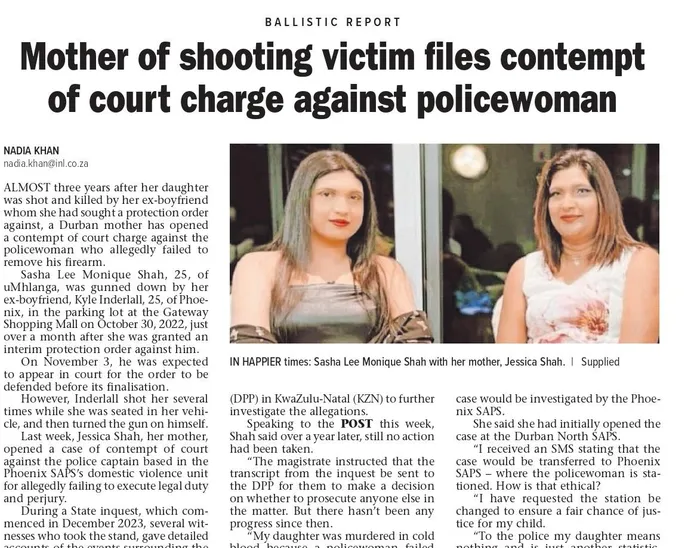GBV in South Africa: unpacking the failures of the justice system
If charges laid against a perpetrator are not sufficiently investigated, evidence is tampered with, delayed or disappears, or the prosecutors are unable to prove the case, then the person reporting the crime remains vulnerable, says Dr Lubna Nadvi

Sasha Lee Monique Shah was killed in a parking lot at Gateway
Image: Facebook
IT WOULD not be an understatement to make the claim that gender-based violence (GBV) has become an epidemic in South Africa and has been one for some time now. Virtually every day the media carries stories of women and children, who have been sexually assaulted, abused, violated, raped, harassed and, in the worst case scenarios, murdered by an intimate partner, a family member or a sexual predator.
Alongside these news reports are further stories of how those who actually survived their attacks tried to report the incident, open cases at a police station, seek justice through the courts, and just simply attempted to negotiate the criminal justice terrain but were repeatedly failed by the justice system as well as the judiciary.
In the recent past, cases such as that of Sasha Lee Monique Shah, who was murdered by her boyfriend in 2022 in the parking lot of a shopping mall, or Cheryl Zondi and her co-accusers, who testified against the Nigerian evangelist Timothy Omotoso on charges of rape and human trafficking among other crimes, are evidence of the failures of the South African criminal justice system, which includes the SAPS, criminal investigators, the National Prosecuting Authority and the courts, who are meant to deliver justice for those who seek it.
However this is not because we don’t have good laws to protect the vulnerable in our society. A quick perusal of the legislation that is meant to protect us from incidences of GBV such as the Domestic Violence Act (DVA), Sexual Offences and Related Matters Act and amendments to them (among other sets of legislation) will reveal some of the most sophisticated and advanced provisions in law that are available anywhere in the world.
For example the Protection Order (whether it is interim or final) contained in the DVA as a legal measure, is meant to ensure that an applicant (someone who is being abused, harassed or violated) can seek protection from the courts by applying to have her (or his) perpetrator legally removed from being in physical proximity to her/himself as well as stipulate other requirements to fortify the protection.

The story that was published in the POST last week.
Image: Post newspaper
The protection order can also be applied for by a family member, or well-wisher of the person being abused. This is to ensure that no acts of GBV are perpetrated against the person, who is seeking protection (especially if they have been abused before).
However, if the provisions contained in the protection order are not properly implemented (due to poor judgement by a magistrate, lack of legal oversight, failure by persons tasked with implementation, such as police officers and sheriffs), then all the laws in the world are of no use as the GBV survivor remains vulnerable.
If charges laid against a perpetrator are not sufficiently investigated or evidence is tampered with, delayed (such as in the case of DNA reports) or disappears, or the prosecutors are unable to prove the case, then the person reporting the crime remains vulnerable.
This is effectively the scenario that we see unfolding repeatedly across the country when it comes to GBV cases. The reality is that there are huge gaps in knowledge, competency and implementation of the GBV legislation that exists within the various sectors of the criminal justice system and the judiciary.
In the case of Sasha Lee Monique Shah, the firearm that the magistrate had instructed should be removed from her boyfriend Kyle Inderlall by a police officer, when serving him with an interim protection order was not taken away from him by the officer. Hence the boyfriend was able to shoot her, taking her life, despite her having a protection order against him.
In order to seek justice, the mother of the deceased victim has opened a contempt of court case against the female police captain, who failed to remove the firearm. It has also emerged that the case has been transferred to the same police station where the female officer is stationed, for investigation. This is in itself a serious indictment on how the justice system works as there is no guarantee that the investigation against the officer will be fair and impartial.
In the Omotoso case, the failure by the prosecutors from the NPA to successfully prove their case against the accused is a stark reminder of the weaknesses of the prosecuting authority to get convictions in GBV cases, despite strong evidence and testimony being presented.
Despite a 2022 Parliamentary Monitoring Report claiming that 74.6% of GBV cases prosecuted by the NPA result in successful convictions, the news reports in the last few years and testimonies from survivors and those who work in the GBV field suggest otherwise.
A discussion with many NGOs working on the ground assisting victims and survivors of GBV will point out the lack of training and infrastructure support at many police stations around the country. When a GBV survivor reports a case, it is usually opened at a police station, which is based in the jurisdiction of where the incident occurred. Often such stations, while able to open a case and produce a case number, are not necessarily capacitated to fully-support GBV cases.
The ability of survivors to get to a police station in the first place to report the crime is often where the challenge starts. There are usually not sufficient sexual assault or rape kits available to obtain DNA evidence at many stations. Police vehicles required to pick up and transport survivors to a safe space are often not available. A case may then subsequently be transferred to another station where there is greater capacity to investigate it.
Often times case dockets go missing or the perpetrator finds a way to stop the case from moving ahead. Where a protection order is granted, the officer/sheriff tasked with serving the order on the perpetrator may omit to follow through on certain aspects of the order. It may be the case that the magistrate granting the order does not take all aspects of the situation of the victim into account such as where she should stay or should her children remain with her or the perpetrator or other family members.
While the Thuthuzela centres are meant to be specialised one stop spaces assisting GBV survivors, increasingly these centres are also not being adequately resourced to address all aspects of the post-incident care such as medical and psychological support.
The challenge of tackling the scourge of GBV in South Africa is a massive undertaking. It requires that those, who assist GBV victims on a daily basis on the ground are central to the process of ensuring that the legal mechanisms created to protect and help GBV survivors actually function. It is of no use having some of the best GBV legislation in the world when many of those tasked with implementing it are poorly trained, mismanage cases or simply have no interest in ensuring the success of the cases.
The delay in fully operationalising the National Council on Gender Based Violence and Femicide is another reason that the GBV pandemic continues. If this matter is not attended to immediately, it will come as no surprise that there will be more Sashas and Cheryls in the future.

Dr Lubna Nadvi
Image: Supplied
Dr Lubna Nadvi is an academic and researcher based at UKZN. She is also a community activist and board member of the Advice Desk for the Abused, which is one of the earliest NGOs in South Africa assisting survivors of Domestic Violence and GBV.
** The views expressed do not necessarily reflect the views of IOL or Independent Media.
Related Topics: